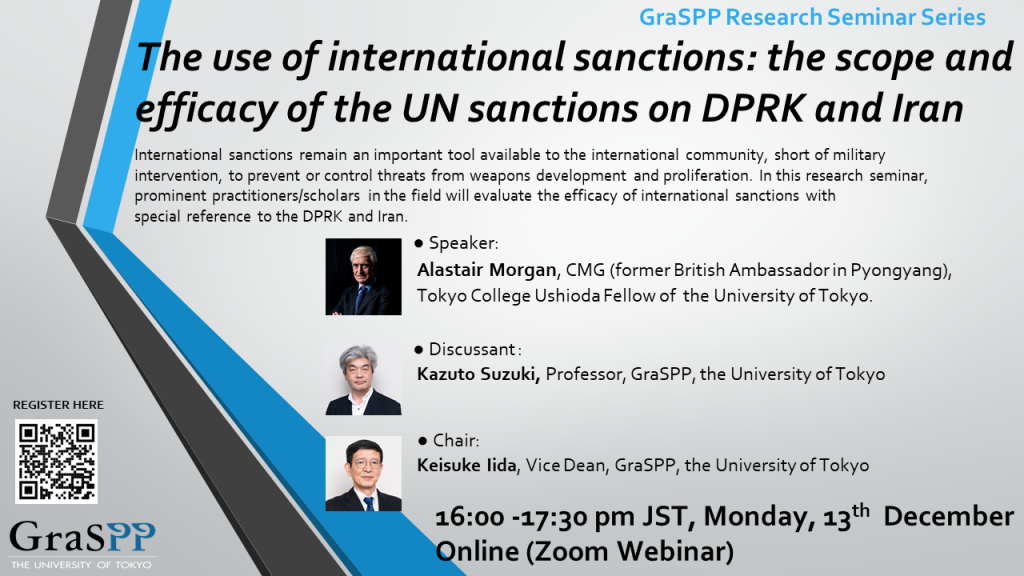
Date: 13 December 2021 16:00-17:30
Venue: Online (Zoom webinar)
Please register from here. The Zoom Meeting URL will be delivered by mail on the day before this event.
Speaker: Alastair Morgan, CMG (former Ambassador), Ushioda Fellow, Tokyo College, the University of Tokyo
Discussant: Kazuto Suzuki, Professor, GraSPP, the University of Tokyo
Chair: Keisuke Iida, Professor, GraSPP, the University of Tokyo
Abstract
International sanctions remain an important tool available to the international community, short of military intervention, to prevent or control threats from weapons development and proliferation. In this research seminar, prominent practitioners/scholars in the field will evaluate the efficacy of international sanctions with special reference to the DPRK and Iran.
Alastair Morgan will consider the current situation concerning UN Security Council sanction regimes under Chapter VII of the UN Charter, with a particular focus on sanctions relating to the nuclear and ballistic missile programmes of the Democratic People’s Republic of Korea. He will speak about issues concerning the scope and efficacy of UN sanctions; the Security Council’s sanctions framework, including dedicated committees and expert panels; the effectiveness of national implementation; and concerns about potential unintended impacts of sanctions – with reference also to the Covid-19 pandemic. He will additionally consider autonomous sanction regimes, with a particular focus on the UK introduction and application of new sanction regimes following Brexit.
Kazuto Suzuki will consider the role and effectiveness of the UN sanctions on Iran in the process towards the Iran Nuclear Deal (JCPOA). He will explain the relationship between autonomous (or unilateral) sanctions by the United States and the European Union, and what role the UN played to bring Iran to the negotiating table. Also, he examines the power of Chapter VII of the UN Charter for implementing the UN Security Council Resolutions. Given that the scope of sanctions was much narrower than in the case of the DPRK, he argues that the UN’s Iran sanctions played a certain role in conflict resolution in the Middle East. He will also discuss the consequences of the US withdrawal from the Iran Nuclear Deal. Finally, in his role as a discussant, he introduces a comparative perspective with regard to the UN sanctions on the DPRK and Iran.
Speakers
This session will be chaired and moderated by Professor Keisuke Iida, GraSPP, the University of Tokyo.
Alastair Morgan served as a British diplomat in Japan, the People’s Republic of China and, from 2015 to 2018, as British Ambassador in Pyongyang, Democratic People’s Republic of Korea. After leaving British government service, he was appointed regional security expert and Coordinator of the UN Panel of Experts on DPRK sanctions from 2019 to 2021. He is currently a project professor and Tokyo College Ushioda Fellow of the University of Tokyo. He is a visiting senior research fellow in the Department of War Studies of King’s College London.
Kazuto Suzuki is professor of Science and Technology Policy at the Graduate School of Public Policy at the University of Tokyo, Japan, and senior fellow at the Asia Pacific Initiative (API), an independent policy think tank. He was assistant researcher at the Fondation pour la recherche stratégique in Paris, France and was professor of International Politics at Hokkaido University until 2020. He served as an expert on the Panel of Experts for the Iranian Sanction Committee under the United Nations Security Council from 2013 to July 2015. He is currently president of the Japan Association of International Security and Trade.
Keisuke Iida is Vice Dean at the Graduate School of Public Policy (GraSPP) , The University of Tokyo. His main areas of research are trade politics and the political economy of regional integration. He is currently leading a study group on economic security at the Japan Institute of International Affairs (JIIA).

